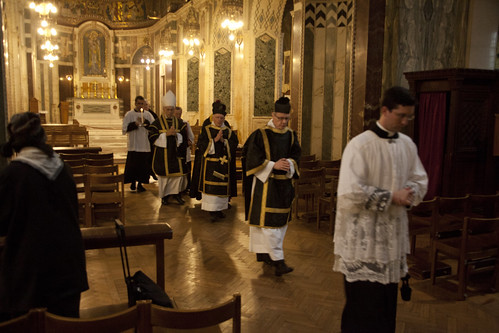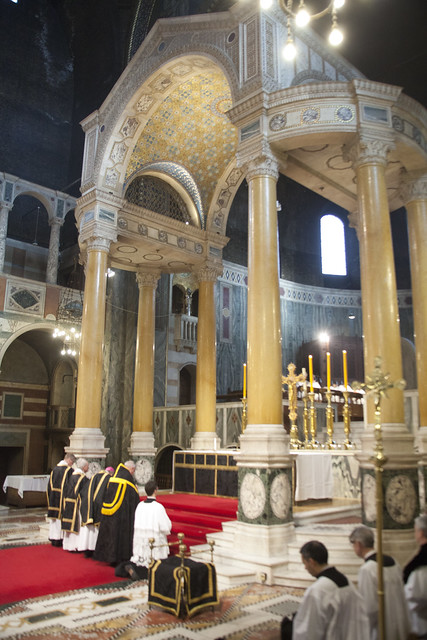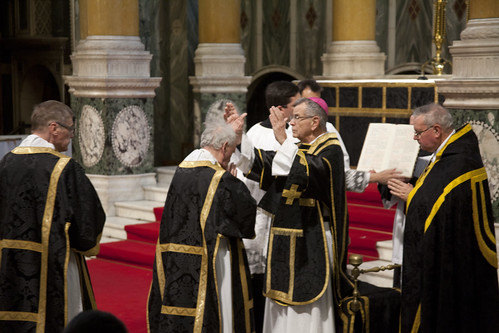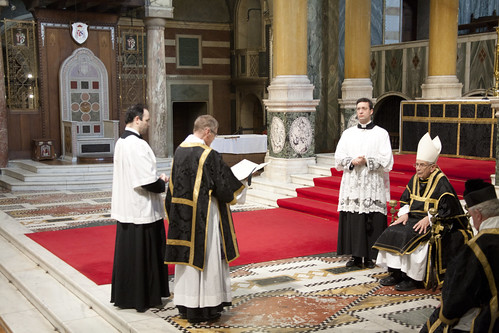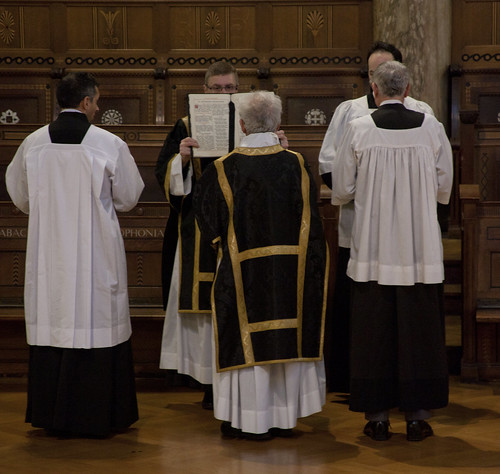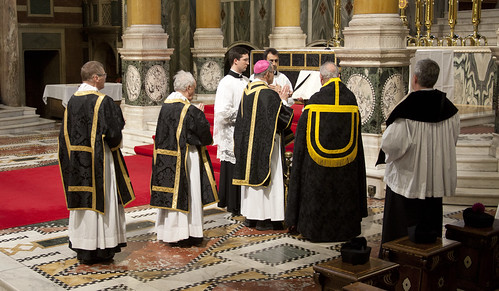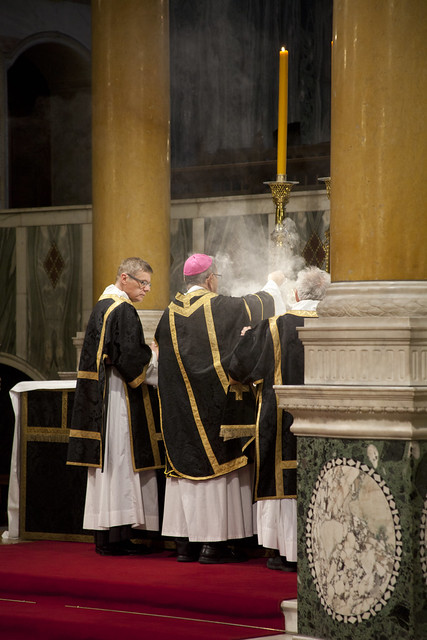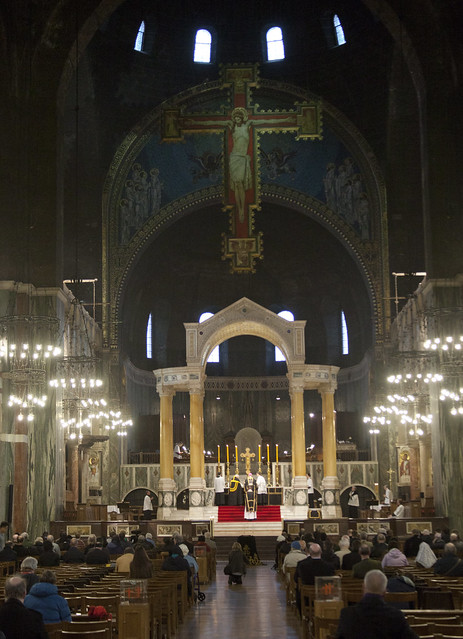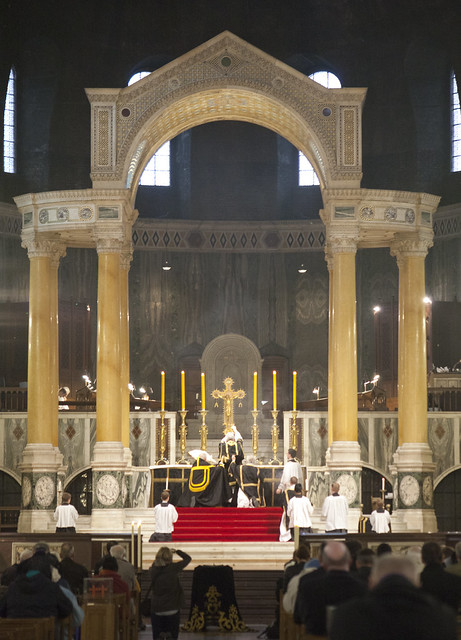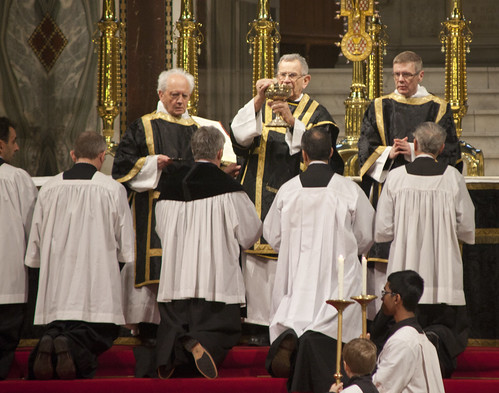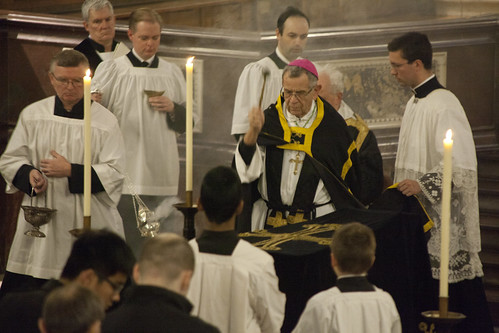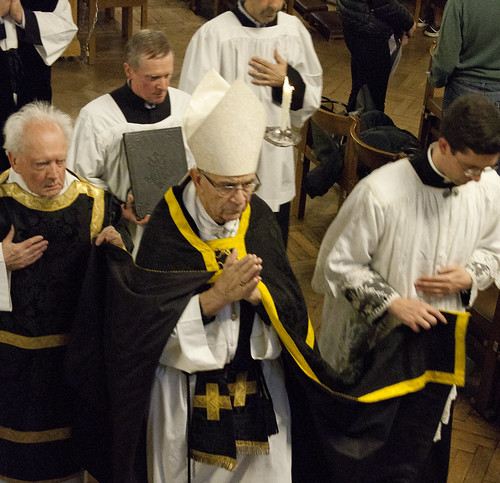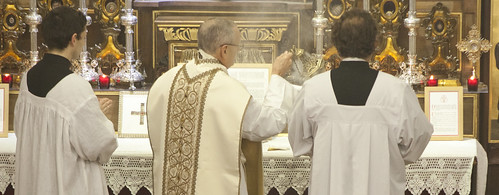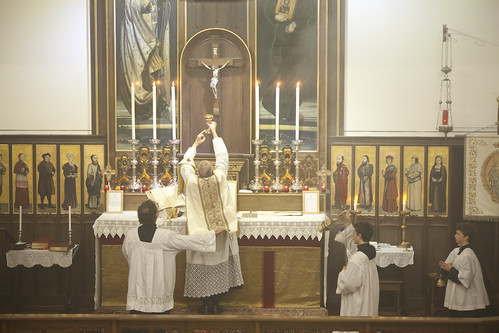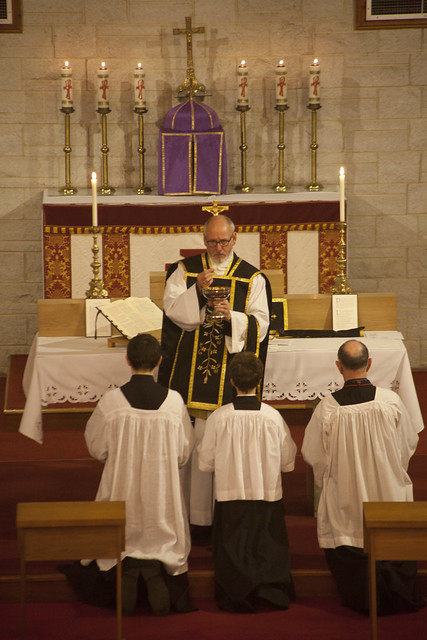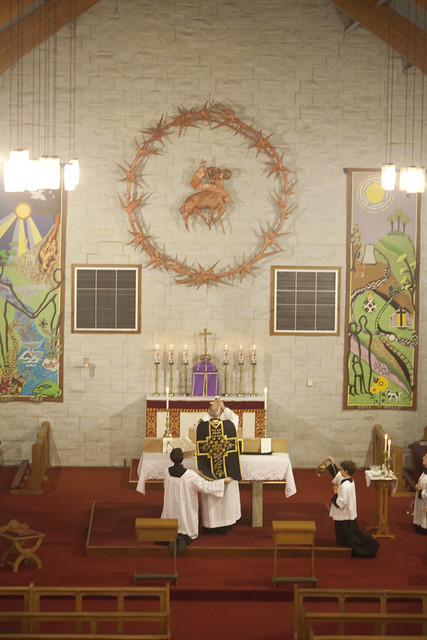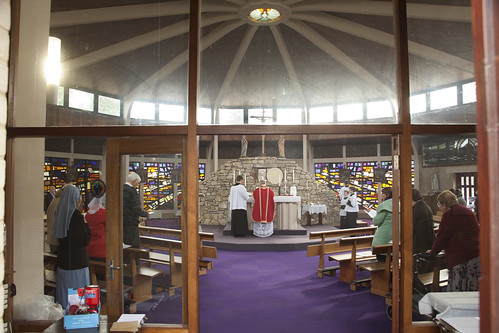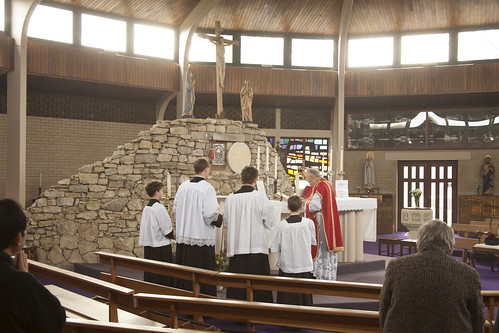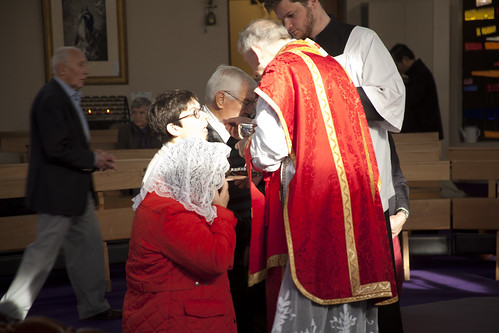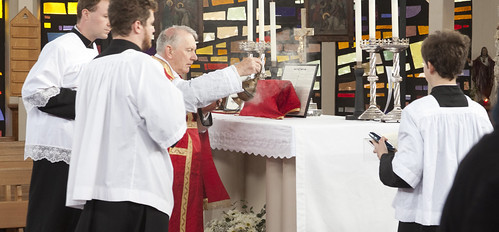Chairman's Blog
Priest Training Conference, Low Week 2018
The LMS Priest Training Conference is back! It didn't happen last year because of the late Easter (Low Week was in term time at our venue, Prior Park).

Tuition will be in small groups. For clergy and seminarians, this will be provided by priests experienced in the Extraordinary Form, for servers this will be provided by laymen with years of experience in the Extraordinary Form.
 The conference will start after lunch on the Monday and conclude before lunch on the Thursday.
The conference will start after lunch on the Monday and conclude before lunch on the Thursday.Full-time students: £60
Seminarians: FREE OF CHARGE
Support the work of the LMS by becoming an 'Anniversary Supporter'.
Autumn Mass of Ages now available
In this issue:
• Bishop Michael Campbell OSA, Bishop of Lancaster, leads us in to the great liturgical seasons of Advent and Christmas with a thought-provoking meditation
Feature on St Augustine's, Ramsgate:
"Augustus Pugin is a name that should be on the lips of every Catholic in England... He became one of the most influential architects and designers of the nineteenth century, championing Catholicism and the Gothic style in everything…
"He said that building a church was the greatest thing a man can do, and that is precisely what he did in Ramsgate. For the greater glory of God, he created this ideal church where God could be worshipped according to the ancient rites of our Holy Mother the Church.”
St Augustine's was the home of The Victoria Consort. Recorded in the Shrine, their CD traces, in Gregorian Chant, the arrival of St Augustine in Kent and the re-establishment of Christianity in England from AD 596.
Feature on the Crib:
"...no Catholic family home is complete, at Christmas, without a Crib: a three-dimensional representation of the Stable at Bethlehem, with its inhabitants” writes Joseph Shaw. “The history of the Crib is an interesting one. It is clearly a cousin of the Medieval Mystery Play, another way of representing and making vivid key scenes from Scripture, which embedded them in the late Medieval Catholic imagination… The crib is a visual Gospel [a point made by Bishop Campbell in his meditiation] and its place in churches is entirely appropriate, as well as in private homes.”
Nativity scenes for your home are available from the LMS online shop.
Book review: Una Voce: The History of the Foederatio Internationalis Una Voce 1964-2003
“Leo Darroch’s important book contains valuable insights into every major development in the treatment of the Traditional Mass over the long period of time it covers, and makes clear the important role of the FIUV. It will be an indispensable work of reference for scholars and historians,
as well as being of interest to anyone who wants to become well informed about the treatment of our liturgical patrimony during its long time in the wilderness.”
Leo Darroch was a member of the LMS Committee from 1986 until 2012; Deputy Chairman to Christopher Inman, and converted the old-style A4 typed reports into a modern magazine style in the early 90s.
Read the full review in Mass of Ages. Better still, buy the book and read it for yourself!
Also included:
Shaun Bennett remembers the Rev. Dom Antony Tumelty OSB.
Matt Showering reports on Tolkein’s devotion to the Blessed Sacrament.
Clare Bowskill reports from the recent LMS Latin Course.
Alisa Kunitz Dick tells about her experiences of teaching Latin and Greek to children.
Our regular columnists:
• Alberto Carosa reports on the 6th Summorum Pontificum Pilgrimage to Rome
• See photographs of our own celebration for the 10th anniversary of Summorum Pontificum
• In her Art and Devotion series, Caroline Shaw looks at The Nativity by Piero Della Francesca
• Mary O’Regan on the significance of the number 13
• Fr Bede Row asks, “Do we still believe in the Devil?”
• The Lone Veiler on ‘The war against women’
Thanks to the cooperation of priests in whose parishes the Traditional Mass is celebrated, Mass of Ages is available from more than 115 cathedrals and churches around the country. If you do not live near one of these but would like a copy of the magazine, we would be very happy to send one from the LMS Office. However, due to the high cost of postage, we do ask that you cover the cost of postage. See here for details.
To help the Latin Mass Society continue its work of promoting and developing Traditional Catholic life and practice in the Church, please consider signing up to our Anniversary Supporters’ Appeal.
A digital copy of the magazine may be read HERE(link is external).
Thanks to the cooperation of priests in whose parishes the Traditional Mass is celebrated, Mass of Ages is available from more than 115 cathedrals and churches around the country. If you do not live near one of these but would like a copy of the magazine, we would be very happy to send one from the LMS Office. However, due to the high cost of postage, we do ask that you cover the cost of postage. See here for details.
Developments at Holy Trinity, Hethe, and Spetchley Park
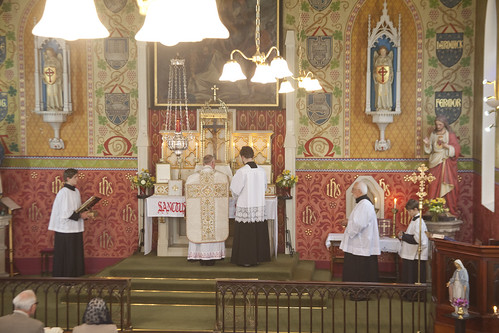 |
| The highly decorated interior of Holy Trinity, Hethe. |
This Sunday, 12th November and Remembrance Sunday, will see Fr Anthony Talbot's last Mass in the Chapel of St John the Baptist, Spetchley Park.
After a short break, however, he will celebrate his first Sunday Mass in Holy Trinity, Hethe, near Bicester, on Sunday 2nd December.
Fr Talbot will be missed in Spetchley, but welcomed in Hethe! This will bring to an end the current situation of a rota of priests serving this Sunday Mass, at 12 noon, which was established three years ago by the Parish Priest Fr Paul Lester. These Masses are sung on the 2nd and 4th Sundays of the month.
Support the work of the LMS by becoming an 'Anniversary Supporter'.
LMS Annual Requiem in Westminster Cathedral: Pictures
Celebrated by Bishop Mark Jabalé, assisted by Mgr Gordon Reid (AP), Fr Patrick Hayward (deacon), Fr Mark Elliot Smith (subdeacon), and Canon Vianney Poucin de Wouilt (1st MC).
It was accompanied by singers of the Cathedral Choir with chant.
Support the work of the LMS by becoming an 'Anniversary Supporter'.
Correctio Filialis: it's not going away
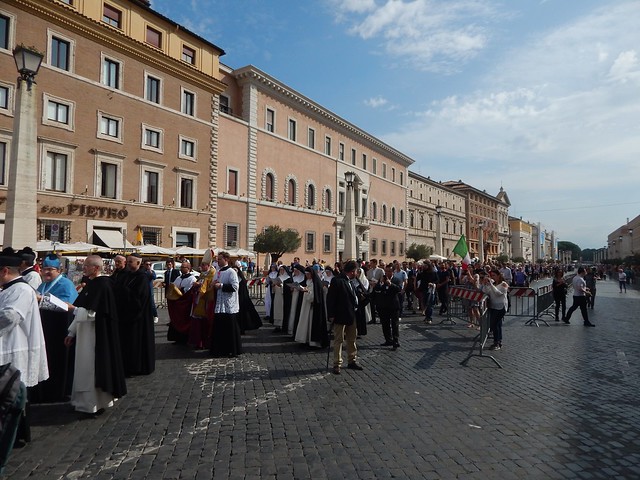 |
| The traddies on the march: the Summorum Pontificum Pilgrimage in Rome marking the 10th anniversary of Summorum Pontificum. It turns out this is just the vanguard. |
Hard on the heels of the distinguished theologian Fr Thomas Weinandy publishing a letter to Pope Francis strongly criticising his government of the Church, Dr. Gregory Popcak has published a remarkable article on the Patheos site, calling for critics of those who say they are 'confused' by Amoris laetitia Ch 8 need to 'repent' of grossly patronising clericalism.
Not all readers may understand the significance of this, so allow me to fill in the background. Dr Popcak, as he explains in the article, is not only a 'pastoral counsellor', but is head of a major centre of pastoral counselling, and trains pastoral counsellors. The Church in the United States has the resources (and of course the needs) to maintain an entire industry of pastoral counselling. Maybe I'm too English, or too traditional (I'd rather talk to a priest), but this kind of thing isn't really my kind of thing. But that's just the point. This industry of pastoral counselling going on over the pond has got absolutely nothing to do with an interest in the Traditional Mass, which some people are now trying to suggest is the common factor in opposition to liberal interpretations of Amoris laetitia. Well, they couldn't be more wrong. This guy is from the centre of the 'conservative', Pope St John Paul II-focused, mainstream, establishment Catholic world, and the Patheos platform, which has hosted a good many attacks on traditional Catholics over the years, is this world's in-house magazine.
Charles Collins, writing in Crux, wanted to play down the significance of the Filial Correction, observing (with some justice) that its language and signatories lean towards the traditionalist end of the spectrum of opinion. He continues:
Instead of presenting a unified front to the pope, the filial correction has highlighted the differences among conservatives in the Church under Francis.
Not just between the Weinandys and the Shaws, but also the numerous conservative Catholics who are confident Amoris Laetitia should be read in a way that doesn’t change the Church’s practice on sexual ethics and position on communion for the divorce-and-remarried.
But this is where he is wrong. The purpose of the Filial Correction wasn't to garner support for the Filial Correction. The purpose was to raise the level of debate about Amoris laetitia and to encourage those with misgivings about the liberal interpretation of Amoris to come forward. In this it has been staggeringly successful. Perhaps it is a coincidence, but the 'Overton Window' of criticisms of the policies and (apparent) personal attitudes of a reigning Pope seems to me to have shifted more in a couple of months than it had in the previous century and a half. Whereas on the eve of the publication of the Correction I was wondering if the signatories would be able to show their faces in public afterwards, I now find myself in the company of a roll-call of distinguished figures. Something important has changed.
The number of academic theologians (and philosophers etc.) who'll sign up to any 25-page theological commentary on any subject is limited, because academics spend their lives using their own words to express their own nuanced positions and teasing open differences of opinion. But the differences between those who signed the Correction and those who've put their reputations on the line to criticise the liberal interpretation of Amoris, using their own words, is hardly a source of comfort for the proponents of that interpretation, because it demonstrates precisely the breadth of the coalition ranged against them.
I have explained before on this blog that it is far easier to assemble a coalition against something than for something, and this explains why progressives often appear more united than conservatives. Well, in this case the boot is on the other foot. The progressives are trying to defend something, admittedly something rather unclear, and the criticisms of it are coming from a wider and wider range of places. Listen to Dr Popcak. He writes with a calm fury:
Deacon Bill, I have no doubt you are a good and faithful man. I am also quite sure you mean well, but I call you to repent of the incipient clericalism that infects your position that the only possible explanation for asking Pope Francis for clarification of chapter 8 of AL is childish obstinacy. I challenge you, and others like you, to repent of the idea that the voices of the thousands of people gracefully striving to live the gospel in their difficult marital circumstances should be discounted. I challenge you to respond with a more authentic approach to both pastoral ministry and evangelization; namely, one that listens to the lived experience of those who are faithfully striving to live the teachings of the Church instead of one that patronizes the laity with the soft clericalism of low expectations.
Why is this happening? People like Fr Weinandy and Dr Popcak have built careers, reputations, even livelihoods, on a positive relationship with the ecclesiastical establishment. For the past 150 years people in that position have not openly criticised the Pope. Now they are. What has brought about this change?
The progressives have no idea what forces they have unleashed. What they have done is pushed these good people into a corner. They have reached their non-negotiable principles. To give up on the indissolubility of marriage, the consequences of mortal sin on the life of grace, and all the other things now being thrown into the air by progressives would be worse than losing their careers, reputations, and livelihoods. This reality can be expressed either in terms of human psychology, or in terms of supernatural Faith, but whether you prefer to think of it as being about their entire self-understanding as Catholics, or what their Faith just will not allow them to do, they have reached the end of the rope.
And you know what? There are lots more people like that out there. Not as many as would be nice, to be sure: there are many time-servers in the Church, and it was ever thus. But there are lots of good people, whose intelligence and integrity will not allow them to - as they see it - acquiesce in apostasy. And this, my friends, may be what the indefectability of the Church looks like in the 21st century.
This is going to run and run.
Support the work of the LMS by becoming an 'Anniversary Supporter'.
ICKSP Sisters arriving in England

The date has now been fixed for the arrival in England of a group of Sister Adorers of the Royal Heart of Jesus, who will establish a community alongside the Institute of Christ the King Sovereign Priest apostolate in Lancaster Diocese.
Support the work of the LMS by becoming an 'Anniversary Supporter'.
All Saints and All Souls in Oxford and Didcot
I sang in SS Gregory & Augustine in Oxford for All Souls, for the Priest in Charge, Fr John Saward (above), and the following day, for All Souls, in Didcot at the Church of the English Martyrs for the Parish Priest, Fr Phillip Harris. I think the latter was probably the first Traditional Sung Mass in the church since the 'changes'. It was a privilege to be of service to Fr Harris in his bringing the Traditional Mass to his parish and his (enormous) church, one of the great things which Latin Mass Society volunteers can do. Fr Harris celebrates Low Mass in English Martyrs most Wednesday evenings.
Support the work of the LMS by becoming an 'Anniversary Supporter'.
Fr Thomas Weinandy, Capuchin theologian, criticises Pope Francis
This caught my eye on Crux partly because Fr Weinandy used to be in Oxford, as head of Greyfriars. It is interesting because Fr Weinandy is something of an establishment figure: a former advisor to the US Bishops' Conference, a member of the International Theological Commission, and a senior member of his order, the Capuchin Franciscans, who aren't exactly traddy bad-boys. And here it is, being reported on John Allen's website, Crux.
It is one of a number of indications that the theological establishment in the United States is not happy with the direction of travel under Pope Francis.
- Fostering “chronic confusion.”
- “Demeaning” the importance of doctrine.
- Appointing bishops who “scandalize” believers with dubious “teaching and pastoral practice.”
- Giving prelates who object the impression they’ll be “marginalized or worse” if they speak out.
- Causing faithful Catholics to “lose confidence in their supreme shepherd.”
Read the whole story on Crux
Support the work of the LMS by becoming an 'Anniversary Supporter'.
Pray for the dead this November
 The Latin Mass Society is selling the perfect collection of prayers this November: prayers for the Faithful Departed, taken from the Raccolta, the old official maual of indulgenced prayers, which was filled with prayers for all occasions authorised and encouraged by the Holy See.
The Latin Mass Society is selling the perfect collection of prayers this November: prayers for the Faithful Departed, taken from the Raccolta, the old official maual of indulgenced prayers, which was filled with prayers for all occasions authorised and encouraged by the Holy See.
Single prayers, prayers for every day of the week, prayers for the bereaved, can all be found in this handy little book.
Yours for £1.95 and not available anywhere else.
Support the work of the LMS by becoming an 'Anniversary Supporter'.
What everyone wants to see...
judging by the comments on Facebook, is more photos of the, er, striking church of Our Lady of Light in Long Crendon, which the Schola Abelis filled with Gregorian Chant last Saturday.
Fr Anthonly Conlon celebrated Mass for the Apostles SS Simon and Jude.
Sadly I didn't have my wide-angle lens, which is ideal to capture the shape of the building.
A good bunch of parishioners came along, and I judge the whole thing to have been a success.
Fr Conlon travelled 20 miles from his parish in Goring. Nine singers and four servers converged on the place for the occasion. We did it at the request of a regular worshipper with the agreement of the Parish Priest. It is all part of preserving the Traditional Mass and confirming it as part of the life of the Church: not just in a little ghetto for confirmed eccentrics, but everywhere, for everyone.
Support the work of the LMS by becoming an 'Anniversary Supporter'.


